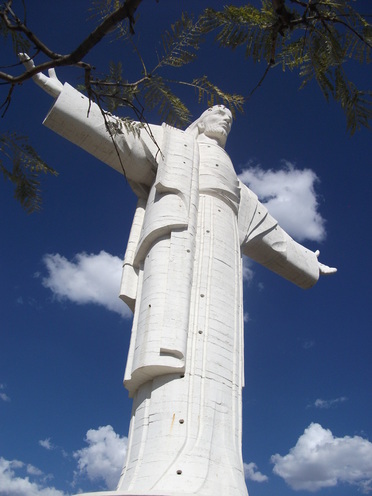|
Bolivia is a land-locked country in the center of South America with 8 different regions and very diverse geography. In the north is rain forest with tributaries to the Amazon River. The south is very dry with salt flats, the east has palm trees and the west has very high mountains.
With over 10 million people, Bolivia is one of the poorest countries in the world with the average worker earning just $2.00 US per day. Most of the people are concentrated in the major cities. Although Bolivia is 95% Catholic with Spanish influences, Lutherans have been in Bolivia since the early 1900’s as German immigrants moved to escape various political regimes. After WW2, many German & Italian refugees settled in South America. In 1531, the Spanish conquered the Inca’s, taking over the Alto Peru which included Bolivia. In 1825 Bolivia became independent from Spain. In 1938 the ElAlta Church was founded by the Missouri Synod and became ELCA in 1970. There are 110 ELCA churches, 40 ordained pastors of which 2 are women. There are over 1100 pastoral volunteers. Pastor’s are paid by offerings, so most pastors have other jobs as well. In the rural areas, many have medical training as hospitals are far away. The poverty level is high, even with an abundance of natural resources such as iron ore, rubber, natural gas, silver gold and cocoa as the government owns the mines and controls the wages. There are also language differences as 61% of the people speak Spanish, 21% speak Quechua, 15% speak Aymara and 4% other. Quechua & Aymara are indigenous peoples languages. According to Bishop Emilio Flora,The church seeks to educate, strengthen infrastructure of clean water and food security, strengthen human rights , to work for sustainable incomes as well as preach the Gospel and offer Grace & Forgiveness. Women coordinators develop community and make aware the needs of the people and families. Daycare, after school programs, sanctuaries for troubled youth, counseling for domestic violence and justice issues. And as Bolivia is the 3rd leading producer of Cocaine, there many issues with trafficking and drug usage. Much like here in the USA. Church schools provide needed education, structure and values, but also address the needs of the whole community. Priorities according to Bishop Emilio are Scholarships for the schools in AlAlto which are $30. US per month and in Santa Cruz are $22.per month. Office computers , music and fencing for the new mission churches in Santa Cruz and CoChabamba as well as building funds. The water project in the north is progressing. Bolivia is a paradox of ancient ruins and somewhat modern cities. We look up to the splendor of the beautiful mountains and blue sky and look down at the heartbreak of homelessness, squalor & dust. The housing of unique traditional Spanish architecture with gorgeous cathedrals and modern Spanish buildings compared to the adobe huts and half-built brick and concrete 3 room apartments that might have running water & a bathroom. A paradox of rarely seen wealthy people in fancy foreign cars and crowds of indigenous hard-working people, walking or waiting for a bus, living day to day to care & provide for their children. The countryside of very small farms, striving to feed livestock & themselves, Helping each other, living off the land, washing clothes in the streams. City living with wild packs of dogs destroying garbage pickup sites, spreading germs & debris. Traffic jams with very few rules, narrow side streets on one way traffic. Pedestrians DO Not have the right of way and Aggressive driving skills are the norm. Outdoor markets & sidewalk venders selling everything from oranges to I-Pod covers. Constant Busy –ness, noise from protests marches ¶des & discos & soccer games until late at night. And those beautiful Andes Mountains and those warm- wonderful - giving people. Would I go again ? -- you bet. Bolivia and its people will always be in my heart. -Gloria Lannen
1 Comment
|
2015 Montana Synod Bolivia Trip
Archives
May 2016
Categories |

 RSS Feed
RSS Feed